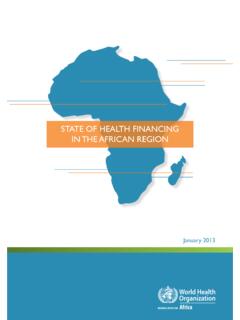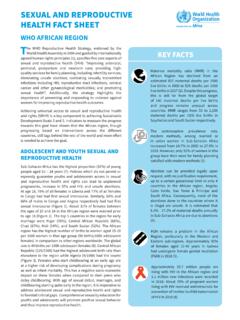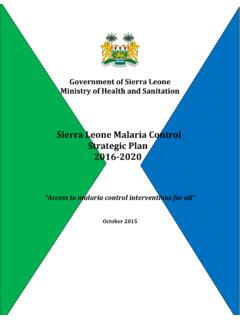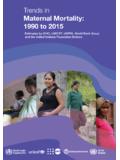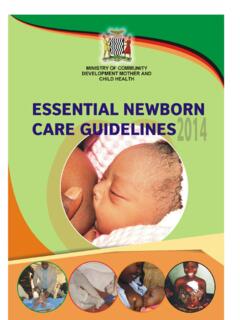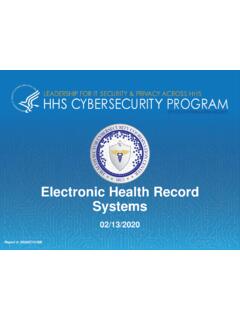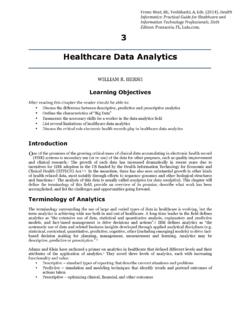Transcription of Health Systems in Africa - World Health Organization
1 Health Systems in Africa Community Perceptions and Perspectives The Report of a Multi-Country Study l l REGIONAL OFFICE FOR Africa Health Systems in Africa Community Perceptions and Perspectives The Report of a Multi-Country Study June 2012. This publication contains the report of an international study team on the perceptions and perspectives of populations on the Health Systems in ten African countries and does not necessarily represent the decisions or the policies of the World Health Organization nor those of the governments concerned Health Systems in Africa Community Perceptions and Perspectives The Report of a Multi-Country Study June 2012. Published by The World Health Organization Regional Office for Africa Brazzaville Republic of Congo WHO Regional Of ce for Africa , 2012. Publications of the World Health Organization enjoy copyright protection in accordance with the provisions of Protocol 2 of the Universal Copyright Convention. All rights reserved. Copies of this publication may be obtained from the Library, WHO Regional Of ce for Africa , Box 6, Brazzaville, Republic of Congo (Tel: +47 241 39100; Fax: +47 241 39507; E-mail: Requests for permission to reproduce or translate this publication whether for sale or for non-commercial distribution should be sent to the same address.)
2 The designations employed and the presentation of the material in this publication do not imply the expression of any opinion whatsoever on the part of the World Health Organization concerning the legal status of any country, territory, city or area or of its authorities, or concerning the delimitation of its frontiers or boundaries. Dotted lines on maps represent approximate border lines for which there may not yet be full agreement. The mention of speci c companies or or certain manufacturers' products does not imply that they are endorsed or recommended by the World Health Organization in preference to others of a similar nature that are not mentioned. Errors and omissions excepted, the names of proprietary products are distinguished by initial capital letters. All reasonable precautions have been taken by the World Health Organization to verify the information contained in this publication. However, the published material is being distributed without warranty of any kind, either express or implied.
3 The responsibility for the interpretation and use of the material lies with the reader. In no event shall the World Health Organization or its Regional Of ce for Africa be liable for damages arising from its use. WHO/AFRO Library Cataloguing in Publication Data Health Systems in Africa : Community Perceptions and Perspectives 1. Health Systems plans Organization and administration 2. Delivery of Health care Organization and administration trends 3. Socioeconomic factors 4. Community Health Planning trends 5. Community Health Workers utilization 6. mAfrica I. World Health Organization . Regional Of ce for Africa ISBN: 978 929 023 2018 (NLM Classi cation: WA 540 HA1). Typeset by AMA DataSet Limited, Preston, Lancashire, UK. Printed and bound by Charlesworth Press, Wake eld, UK. iv Contents List of abbreviations vii Report writing team viii Foreword ix Acknowledgements x Executive summary xi Chapter 1 Introduction 1. Chapter 2 Research Questions and Objectives 3. Overall research questions 3.
4 Research objectives 3. Chapter 3 Methodology 5. Study design and methods 5. Study sites and population 5. Sampling 5. Research instruments 6. Data analysis 7. Ethical considerations 7. The study process 8. Study limitations 8. Chapter 4 Results 9. Socio-demographic information 9. Community perceptions of Health and Health care delivery 12. Experience with Health services 30. Community perceptions of Health care financing 36. Health system goals and social capital 43. Chapter 5 Discussion 49. Chapter 6 Conclusions 57. Chapter 7 Recommendations 59. Chapter 8 References 61. v Health Systems in Africa : Community Perceptions and Perspectives Annexes 65. Annex 1: Definitions of terms 65. Annex 2: Distribution of mean age by site 67. Annex 3: Distribution of respondents who had ever attended school by sex 67. Annex 4: Proportion reporting diabetes as a common Health problem per site 68. Annex 5: Common Health problems of older persons by locality 68. Annex 6: Rating of involvement of communities in decision making by locality 68.
5 Annex 7: Households needing Health care by locality 69. Annex 8: Households needing Health care by performance of district 69. Annex 9: Most common reasons why Health care was sought by sub-region 70. Annex 10: Reimbursement of money paid for drugs in sub-region 70. Annex 11: Freedom of expression by loacility 71. Annex 12: Freedom of expression on Health matters by sub-region 71. Annex 13: Location of the study sites 71. Annex 14: Research Team 72. vi List of abbreviations AFRO WHO Regional Of ce for Africa ANC Antenatal Care APOC African Programme for Onchocerciasis Control ARVs Antiretrovirals BCC Behaviour Change Communication BCG Bacille-Calmette-Gu rin CAR Central African Republic CBHI Community-Based Health Insurance CBO Community-Based Organization CDTI Community-Directed Treatment with Ivermectin CSO Civil Society Organization DHS Demographic and Health Survey DPT3 Diphtheria Pertussis Tetanus (three doses). DRC Democratic Republic of the Congo FGD Focus Group Discussion HHH Head of Household HIV/AIDS Human Immunode ciency Virus/Acquired Immunode ciency Syndrome IDI In-depth Interview IGA Income-generating Activity IRB Institutional Review Board LGA Local Government Area MDGR Millennium Development Goals Report MDG Millennium Development Goal MOU Memorandum of Understanding NCD Noncommunicable Disease NGO Non-governmental Organization NID National Immunization Day PHC Primary Health Care PMTCT Prevention of Mother-to-Child Transmission RC Regional Committee SPSS Statistical Package for Social Sciences SSA Sub-Saharan Africa TB Tuberculosis TDR UNICEF/UNDP/ World Bank/WHO Special Programme for Research and Training in Tropical Diseases UN United Nations UNDP United Nations Development Programme UNICEF United Nations Children's Fund WHO World Health Organization vii Report writing team Listed in alphabetical order Dr Uche Amazigo Prof Peter Ndumbe Dr Mary Amuyunzu-Nyamongo Dr
6 Richard Ndyomugyenyi Dr Tieman Diarra Dr Ngozi Njepuome Prof S. J. H. Hendricks Prof Martin Oka Obono Dr Tarcisse Elongo Lokombe Prof Joseph Okeibunor Prof Paul-Samson Lusamba-Dikassa Dr Luis G. Sambo Prof Pascal Lutumba Ms Yolande F. Longang Tchounkeu Dr Leonard Mukenge Mr Honorat G. M. Zour . viii Foreword During my address to the Sixty-fourth World sector, the participation of all related sectors as Health Assembly on 16th May 2011, I made well as the participation of the community in the the point that all of our debates and discussions planning, Organization , operation and monitor- in the Health arena only have meaning when ing of Health delivery mechanisms. Since Health they improve the Health of people and relieve care delivery mechanisms are intended for the their suffering. I therefore urged delegates at the community, the non-participation of communi- assembly to remember the people . ties may result in irrelevant interventions. I am pleased to commend the research team The results of this study are enlightening and that sought the community perceptions and per- revealing.
7 Communities had clear perceptions spectives regarding Health Systems in the WHO of Health and service delivery. They included African Region in order to provide the evidence the physical, mental, emotional, spiritual, social base for more relevant, responsive and equita- and economic well-being in their de nition of ble services that meet people's expectations and Health and underlined the necessity of our Health respond adequately to their needs. services to be more responsive to all of the Health The inequalities in the Health status of peo- needs of the community and not only to focus ple between and within countries have been a on some of them. These ndings are worthy of cause for concern for Health managers and pro- our attention. viders over time. They led to the Alma-Ata The respondents in this study also identi ed Declaration and its other reiterations such as the areas in which their participation could improve Ouagadougou Declaration. the overall governance of the Health delivery When we compare the key Health indicators Systems .
8 There is evidence that governance in the World , for example those related to the and accountability issues, if properly addressed, Millennium Development Goals, we are struck would contribute to ensuring the achievement with the uneven distribution of Health across of positive outcomes of the different Health countries, within countries, and between popu- interventions. lation sub-groups, rich and poor, men and I hope that the results of this study will be women. Further, there are differences between discussed with all national stakeholders so that rural and urban areas in coverage of key Health policies and strategies are developed to respond services such as skilled attendance at birth, appropriately to our people's needs. This will immunization, and diagnosis and treatment lead us towards universal coverage and the of common diseases. These inequities can be attainment of the highest level of Health that our avoided through the adoption and implementa- countries and populations can afford.
9 Tion of relevant Health and development policies that seek to minimize variations of Health indica- tors associated with socioeconomic status. In essence, the attainment of an acceptable Dr Margaret Chan level of Health requires, in addition to the Health WHO Director-General ix Acknowledgements The research team is grateful to the ministries The team thanks the research and academic of Health and other national departments for institutions of the participating countries and their support including technical assistance, their staff for in-country support, and the WHO. ethical approvals and permission to conduct the Regional Of ce for Africa and the African study in the ten countries: Algeria, Cameroon, Programme for Onchocerciasis Control staff for Central African Republic, Democratic Republic their assistance. of the Congo, Kenya, Niger, Nigeria, Senegal, The research team is particularly grateful to South Africa and Uganda. It is indebted to lead- the ministers of Health of the participating coun- ers and managers of Health institutions at the tries for their feedback on the brie ng presented different levels, frontline Health workers, com- by the study initiators (20 May 2012 in Geneva, munity members and their leaders in the various Switzerland) and their consent to publish the study sites for their time and invaluable contri- study results.
10 Butions that ensured the successful conduct of The WHO Regional Of ce for Africa and the study. the African Programme for Onchocerciasis Control provided the funding for this study. x Executive summary In all hospitals, even in clinics, there is no human capital and indigenous knowledge of love. When you arrive at the hospital, they give the end-users. you the patient form. He holds his pen. You 3. Improving the delivery capacity of national tell him: Papa, write, my child is dying; he Health services in Africa goes beyond dec- will answer, pay the money. He even crosses larations and increased nancing. It also his legs; you are anxious, dgeting and he requires the input of communities. In view will insist that you pay the money. Before the of this, we engaged people in urban, peri- money arrives, the child dies. There is no urban and rural areas in this study with the love there. To use the hospital, it is money in objective of understanding their perceptions full or you'll die if you do not have the money and perspectives on Health and Health service (Focus Group Discussion women).
